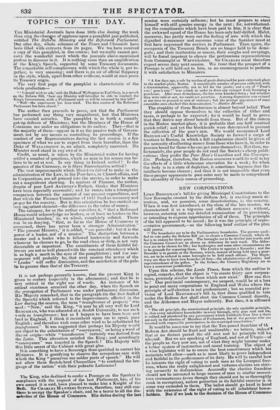TOPICS OF THE DAY.
THE Ministerial Journals have done little else during the week than ring the changes of applause upon a pamphlet just published, . entitled The Belem Ministry and the Reformed Parliament. Day after day, whole columns of the Times and Chronicle have been filled with extracts from its pages. We too have received a copy of this pamphlet, in due course; but we really cannot per- ceive the wonderful merit which the journals above-mentioned profess to diseover in it. It is nothing more than an amplification of the King's Speech, supported by some Treasury documents. The remarkable self-complacency with which the whole is put to- gether, is very amusing; and there isfiri air of official flippancy
in. the style, which, apart from other evidence, would at once prove its Treasury origin. The very first page of the pamphlet is characteristic of the whole production-
", I should wish to ask,' said the Duke of Wellington to Earl Grey, in a speech on the Reform Bill, how any Ministry will hereafter be able to conduct the King's Government, with a Parliament such as will be returned by this bill ?
" Well—tbe experiment has been tried. The first session of the Reformed Parliament has been closed."
The author then proceeds to prove, not that the Parliament has performed: any thing very magnificent, but that Ministers have enacted miracles. The pamphlet is in truth a smartly got-up defence of Ministers; but the Members of the House of' Commons are under no obligations to its author. They—that is the majority of them—appear in it as the passive tools of Govern- ment, not by any means as controlling its proceedings. If the Conduct of our Representatives during the last session is a fair specimen of what we are to expect from them hereafter, then the Duke of WELLINGTON is, we admit, completely answered. No Minister need stand in any awe of it. Credit, as usual, is taken by the Ministerial writer for having settled' a number of questions, which no man in his senses can be- lieve to be set at rest. Is any thing in Ireland settled ? Is the question of the Currency, or is Slave Emancipation settled ? The vast improvements which Ministers intend to snake in the administration of the Law, in the Poor-laws, in Church affairs, and in Corporations, are all pressed into the service, in order to make outg magnificent showing. In matters of Finance, the author, despite of poor Lord ALTHORP'S Budget, thinks that Ministers have been especially successful; and he enters into a triumphant comparison between the amount of our present expenditure, and that wWch the Finance Committee of 1817 fixed as necessary and preper for the country..., But in this calculation be has omitted one very important element—the difference in the value of money. The calumny, for so the author con' ders it, " that a Reformed Rouse would acknowledge no leaders, or at leapt no leaders on the Ministerial benches," is, we admit, completely refuted. There can be no denying, " that, as far as the House of Commons is concerned, there has never been a stronger Administration." . " The present Ministry," it is added, " are powerful ; but it is the power of a leader, not of a master." The distinction between a master and a leader who is followed backwards and forwards wherever he chooses to go, be the road clean or dirty, is not very discernible or important. The constituents of these faithful fol- lowers are not so well pleased with the constant attendance which is so high a merit in the eyes of the pamphleteer; and the con- sequence will probably be, that next session the power of the " Leader " will suffer diminution, and the satisfaction of the pub- lic be greater than that of the Treasury.


















 Previous page
Previous page